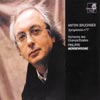Bruckner Symphony No 7
Period Bruckner has its charms but true authenticity is still elusive
View record and artist detailsRecord and Artist Details
Composer or Director: Anton Bruckner
Genre:
Orchestral
Label: Harmonia Mundi
Magazine Review Date: 10/2004
Media Format: CD or Download
Media Runtime: 60
Mastering:
Stereo
DDD
Catalogue Number: HMC90 1857

Tracks:
| Composition | Artist Credit |
|---|---|
| Symphony No. 7 |
Anton Bruckner, Composer
Anton Bruckner, Composer Champs-Élysées Orchestra, Paris Philippe Herreweghe, Conductor |
Author: Richard Osborne
The charm of this performance is that it is played on instruments of the period. Gut strings and a mellower, less forceful though no less pungent wind choir suit Bruckner. To hear the long-drawn opening melody, the solemn incantation of the Adagio’s start or the finale’s A flat chorale played in so simple and unworldly a manner is to recognise the St Francis in Bruckner.
Herreweghe touches on this in the manifesto which inevitably accompanies the performance. Bruckner’s music, he writes, ‘is profoundly melancholy; it mourns paradise lost, it strives (and manages), like no other, to evoke calm and reassurance’. Where, I wonder, is the ‘reassurance’ in ‘paradise lost’? Thomas Mann put it better in Dr Faustus where Kretschmar dubs Bruckner a ‘pure’ musician, a true ‘naïf’, to be distinguished from those composers, Wagner the prime example, whose music celebrates its own power in daemonic, sensuously alluring acts of self-revelation.
In the expository material, Herreweghe’s performance sounds well enough. Unfortunately, there is more to a Bruckner symphony than the sound it makes or the principal themes out of which it is built. The finest Bruckner conducting sees the larger picture and traces the longer argument, tying pulse and rhythm and long-term harmonic movement inextricably together. Herreweghe, by contrast, favours flowing tempi (until he has to slow for some unignorable meditative transition), lightly sprung rhythms and a certain short-termism in phrasing and harmonic thinking. Such is his shaping of the Adagio and reluctance to draw a full-bodied triple forte from his orchestra, you would miss its great glowing climax if you didn’t know it was there. (No cymbal clash, needless to say.) The symphony’s peroration also lacks ‘grip’, though the gamesome finale, and before it the al fresco Scherzo and Trio, are charmingly done.
Herreweghe’s essay has hard things to say about Brucknerians of yesteryear who, he claims, enveloped the composer in a ‘pseudo-mystical fog’. The ‘interwar years’ are singled out for special mention, which is odd because these were the years of the first great Bruckner revival based on Robert Haas’s new per-forming editions. Indeed, for a real ‘period’ performance, collectors may care turn to Jascha Horenstein’s splendidly recorded 1928 Berlin Philharmonic version. Tempi are not dissimilar to Herreweghe’s with the difference that Horenstein shows a cohesive understanding of Bruckner’s long forms, keenly detailed yet seamlessly rendered, the climaxes superbly ‘placed’. Furthermore, the superbly equipped Berlin Philharmonic (trained by Nikisch, who conducted the work’s first performance in Dresden in 1884) knows the music and its provenance in a way the mellow-sounding Orchestre des Champs-Elysées cannot begin to do in such unfamiliar repertory at so great a remove of time.
Herreweghe touches on this in the manifesto which inevitably accompanies the performance. Bruckner’s music, he writes, ‘is profoundly melancholy; it mourns paradise lost, it strives (and manages), like no other, to evoke calm and reassurance’. Where, I wonder, is the ‘reassurance’ in ‘paradise lost’? Thomas Mann put it better in Dr Faustus where Kretschmar dubs Bruckner a ‘pure’ musician, a true ‘naïf’, to be distinguished from those composers, Wagner the prime example, whose music celebrates its own power in daemonic, sensuously alluring acts of self-revelation.
In the expository material, Herreweghe’s performance sounds well enough. Unfortunately, there is more to a Bruckner symphony than the sound it makes or the principal themes out of which it is built. The finest Bruckner conducting sees the larger picture and traces the longer argument, tying pulse and rhythm and long-term harmonic movement inextricably together. Herreweghe, by contrast, favours flowing tempi (until he has to slow for some unignorable meditative transition), lightly sprung rhythms and a certain short-termism in phrasing and harmonic thinking. Such is his shaping of the Adagio and reluctance to draw a full-bodied triple forte from his orchestra, you would miss its great glowing climax if you didn’t know it was there. (No cymbal clash, needless to say.) The symphony’s peroration also lacks ‘grip’, though the gamesome finale, and before it the al fresco Scherzo and Trio, are charmingly done.
Herreweghe’s essay has hard things to say about Brucknerians of yesteryear who, he claims, enveloped the composer in a ‘pseudo-mystical fog’. The ‘interwar years’ are singled out for special mention, which is odd because these were the years of the first great Bruckner revival based on Robert Haas’s new per-forming editions. Indeed, for a real ‘period’ performance, collectors may care turn to Jascha Horenstein’s splendidly recorded 1928 Berlin Philharmonic version. Tempi are not dissimilar to Herreweghe’s with the difference that Horenstein shows a cohesive understanding of Bruckner’s long forms, keenly detailed yet seamlessly rendered, the climaxes superbly ‘placed’. Furthermore, the superbly equipped Berlin Philharmonic (trained by Nikisch, who conducted the work’s first performance in Dresden in 1884) knows the music and its provenance in a way the mellow-sounding Orchestre des Champs-Elysées cannot begin to do in such unfamiliar repertory at so great a remove of time.
Discover the world's largest classical music catalogue with Presto Music.

Gramophone Digital Club
- Digital Edition
- Digital Archive
- Reviews Database
- Full website access
From £8.75 / month
Subscribe
Gramophone Full Club
- Print Edition
- Digital Edition
- Digital Archive
- Reviews Database
- Full website access
From £11.00 / month
Subscribe
If you are a library, university or other organisation that would be interested in an institutional subscription to Gramophone please click here for further information.




